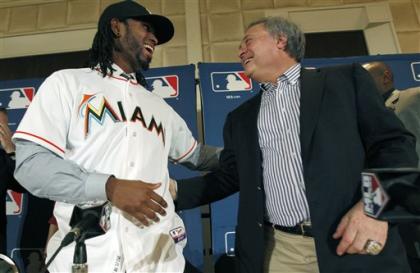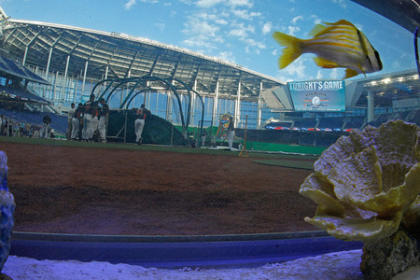Jeffrey Loria's spin cycle: Separating fact from flack for Marlins fans

Dear Marlins fans,
What you are about to read is the truth. The real truth. Not some message manufactured by the Miami Marlins' new public-relations firm in its attempt to make the team's owner, Jeffrey Loria, less of a villain.
For years, I have called Loria and the Marlins' team president, David Samson, a laundry list of names. There will be no name-calling here. Loria says he wants to play the fact game. So play we will.
Facts are powerful. Facts come from deeds and actions, not the keyboard of a flack. Facts lay bare these truths: The Marlins pocketed windfall profits, shielded that money from politicians when campaigning for a new stadium, promised to increase payroll only to shed it less than a year later, and through their lies saddled Miami taxpayers with a $2.4 billion tax burden.
This week, the barrage of spin orchestrated by Loria's handlers tumbles on. Tonight he will meet with Marlins beat reporters for a cocktail hour. On Tuesday, he will arrive in Jupiter, Fla., to face angry fans at the Marlins' spring-training complex.
[Also: Curtis Granderson injury puts Yankees in a bind]
His first salvo came Sunday via an open letter in Miami-area newspapers. The words below are from his letter. The responses are mine.
Loria: "It's no secret that last season was not our best – actually it was one of our worst. In large part, our performance on the field stunk and something needed to be done."
Fact: An owner is entitled to do what he or she pleases with a franchise. When a team loses 93 games, change is welcome. Dumping Jose Reyes, Mark Buehrle, Josh Johnson, Emilio Bonifacio and John Buck on the Toronto Blue Jays for a grab bag of prospects was well within Loria's rights.

Loria:
"Many of the things being said about us are simply not true."
Fact: Calling the Marlins a major league team is one of those things.
Loria: "Losing is unacceptable to me."
Fact: The Marlins' record during Loria's ownership is 877-904. From 2002-2011, the Marlins' opening day payrolls were a combined $410.1 million, the lowest in baseball.
Loria: "The controversial trade we made with the Toronto Blue Jays was approved by Commissioner Bud Selig."
Fact: The last trade blocked by a baseball commissioner was in 1976.
Loria: The trade "has been almost universally celebrated by baseball experts outside of Miami for its value."
Fact: The trade has not been universally celebrated. Less than a year after signing Reyes, a franchise shortstop, and Buehrle, a workhorse starter, the Marlins dealt them, along with Johnson, the best pitcher in team history, and instantaneously turned the Blue Jays, a sub-.500 team last season, into the favorites in the American League. In return, the Marlins received prospects Justin Nicolino, Jake Marisnick and Adeiny Hechavarria, plus shortstop Yunel Escobar – whom they traded to Tampa Bay for prospect Derek Dietrich – pitcher Henderson Alvarez, catcher Jeff Mathis and a non-prospect. The Marlins did not get Travis d'Arnaud, Aaron Sanchez, Noah Syndergaard or Anthony Gose, the Blue Jays' four best prospects.
[Also: Rockies' Todd Helton reflects on life, baseball as retirement nears]
Loria: "Acquiring high-profile players just didn't work, and nearly everyone on our team underperformed as compared to their career numbers."
Fact: Spending $27 million on closer Heath Bell, who bombed out, was an obvious mistake at the time. After a tough start, Reyes hit .312/.361/.495 in the second half. Buehrle was his steady, sturdy, 200-inning self. Johnson spent most of the season on the mend and still managed a 3.81 ERA over nearly 200 innings. That said, trying to play this off as a baseball decision is at best disingenuous. No smart business sells its assets at their nadir. If the Marlins were serious about signing the veterans in the first place, they could have waited for them to rebuild value and tried to grow around them, or decided it wasn't working after more than one season and then flipped them.
Loria: "Our plan for the year ahead is to leverage our young talent and create a homegrown roster of long-term players who can win."
Fact: For lower-revenue teams, this is often the best path to take. Had Loria's Marlins not spent a decade rearing young players only to trade them once their salaries spiked, he would have some moral high ground here.
[Baseball 2013 from Yahoo! Fantasy Sports: Join a league today!]
Loria: "In fact, objective experts have credited us with going from the 28th ranked Minor League system in baseball to the 5th best during this period. Of the Top 100 Minor Leaguers rated by MLB Network, we have six."
Fact: This is a sneaky attempt by Loria to conflate the trades with the health of the Marlins' farm system. Of those six, only two were acquired in trades: Nicolino and Marisnick from the Blue Jays. The Marlins' two best prospects, pitcher Jose Fernandez and outfielder Christian Yelich, were savvy draft picks. Another, Andrew Heaney, was a first-round pick last year, and the fourth, Marcell Ozuna, was signed out of the Dominican Republic. Even without Nicolino and Marisnick, the Marlins might have been a top-10 farm system.

Loria:
"The very same naysayers who are currently skeptical once attacked us for bringing Pudge Rodriguez to the Marlins in 2003. More than any other, that move contributed to our World Series Championship."
Fact: Rodriguez was 31. His only other offers were for three years and $18 million from Baltimore or to play in Japan. He was coming off three consecutive seasons of 111 games or fewer. Loria bailed him out with a one-year, $10 million deal. Rodriguez hit .297/.369/.474, was superb in the postseason and played another eight seasons.
Loria: "The ballpark issue has been repeatedly reported incorrectly and there are some very negative accusations being thrown around. It ain't true, folks."
Fact: Ain't is grammatically incorrect.
[Also: Watch Bryce Harper make a circus catch]
Loria: "Those who have attacked us are entitled to their own opinions, but not their own facts."
Fact: Here is where it gets ridiculous.
Loria: "The majority of public funding came from hotel taxes, the burden of which is incurred by tourists who are visiting our city, NOT the resident taxpayers."
Fact: Beyond the morally flimsy idea that it's OK to saddle tourists who help drive Miami's economy with excessive taxes, this avoids a very important truth. While the tax dollars that fund the stadium come from tourism money devoted to sports and convention complexes, to free the tourism-tax dollars, the county shifted general-use monies from property taxes to pay other debt. Ultimately, stadium money did come from local residents.
Loria: "The Marlins organization also agreed to contribute $161.2 million toward the ballpark, plus the cost of the garage complex."
Fact: This is true. The Marlins' contributions accounted for a little more than a quarter of the ballpark's final cost: $634 million.
Loria: "In addition, the Marlins receive no operating subsidy from local government funding. The ballpark required that all debt service is paid by existing revenue."
Fact: This is true, too, though almost every team that plays in a publicly funded stadium pays some sort of unsubsidized rent. The Marlins, however, pocket every ticket, concession, parking and advertising dollar. That one-sided arrangement is not standard.
Loria: "Furthermore, many are attacking the County's method of financing for its contribution, but the Marlins had nothing at all to do with that."
Fact: The Marlins had plenty to do with it. For years, Samson went to politicians insistent that in order to survive financially, the Marlins needed a new stadium. At the same time, he refused to show them the Marlins' finances. By the time someone leaked them to Deadspin, local governments had agreed to take out $409 million worth of loans that would balloon to $2.4 billion. One in particular is egregious: a $91 million note from J.P. Morgan that will have cost the county $1.2 billion by the time it's paid off in 2047. Had the county commissioners seen the Marlins' financial statements, the stadium deal almost certainly wouldn't have passed, the financial mess that is Marlins Park never would've come to be and Loria likely would have moved or sold the franchise.
[Also: Curt Schilling's bloody sock fetches hefty price]
Loria: "The fact is, with your help, we built Marlins Park, a crown jewel in our beautiful Miami skyline, which has won over twenty design and architecture awards and will help make us a premiere ballclub moving forward."
Fact: That amounts to $120 million in tax dollars per design award. At least Miami residents can say their Construction Association of South Florida Craftsmanship Awards for ceramic tile, glass and glazing, ornamental metal and stucco cost only half a billion dollars.
Loria: "The simple fact is that we don't have unlimited funds, nor does any baseball team or business."
Fact: The Marlins lost tens of millions of dollars last season. In the previous six seasons, according to Forbes, their combined operating profits were $198 million and the franchise grew in value by $206 million. In at least two of those years, according to their financial documents, they paid money to Double Play Company for a "management fee." Loria and Samson run Double Play. The owners were paying themselves to … own the team.

Loria:
"Fans didn't turn out last season as much as we'd like, even with the high-profile players the columnists decry us having traded."
Fact: The assumption from the Marlins that fans would show up simply for a new stadium, a rebrand (new uniforms, switching from the Florida Marlins to the Miami Marlins) and bigger-name players proved false. They based financial projections on an average attendance of more than 30,000 per game. Their final announced attendance was 2,219,444, an average of 27,401.
Loria: "Are we fiscally capable and responsible enough to fill the roster with talented players, invest in the daily demands of running a world-class organization and bring a World Series back to Miami? Absolutely!"
Fact: During his time as Marlins owner, Jeffrey Loria, who claims winning another World Series is a priority, has traded Miguel Cabrera, Jose Reyes, Josh Johnson, Mark Buehrle, Josh Beckett, Derrek Lee, Mike Lowell, Hanley Ramirez, Anibal Sanchez, Carlos Delgado, Josh Willingham, Paul LoDuca and Luis Castillo. Oh, and he told Reyes to buy a house in Miami two days before the deal.
[Also: Steve Garvey battles prostate cancer, aims to bring awareness]
Loria: "Is it sound business sense to witness an expensive roster with a terrible record and sit idly by doing nothing? No."
Fact: It demands something, certainly. Gutting the entire team in such fashion, executives across baseball believe, was not the most prudent solution if the Marlins were going to return to skinflint payrolls, which they have.
Loria: "I can and will invest in building a winner, but last season wasn't sustainable, and we needed to start from scratch quickly to build this team from the ground up."
Fact: Loria and Samson are in a difficult situation: selling baseball in Florida. Tampa Bay's management is the game's best, its ownership is well-regarded and while its ballpark is a hole and its location is suspect, the Rays have won, won big and still not drawn. What they say – if we build a new stadium, fans will come – was once said about the Marlins. And even before they started the most recent fire sale, Marlins Park sold out only once, opening day.
Loria: "An organization is only as good as its connection with the community. We know we can do a better job communicating with our fans."
Fact: On March 12, 2002, right after he took control of the Marlins, Loria told fans at a meeting: "We will spend a lot of time meeting with people, talking with fans." So take that for what you will.
Loria: "From this point forward we can ensure fans and the entire community that we will keep you abreast of our plan, rationale and motivations."
Fact: To be determined. Transparency hasn't exactly been a Marlins strong point.
Loria: "In 2003, I helped bring a second World Series Title to South Florida. We know how to build a winning team, and have every intention of doing so again."
Fact: In 2002, the Marlins' opening day payroll was $42 million. In 2003, it was $49.2 million. Loria's contributions amounted to a 14-percent increase in payroll, bringing the Marlins from 25th overall in baseball to … 25th. After the 2003 championship, Loria dismantled the Marlins. By 2006, their opening day payroll was below $15 million.
Loria: "We're in this together and I humbly ask that we start fresh, watch us mature quickly as a ball club, and root for the home team in 2013."
Fact: Loria is asking for trust from people whose money he has taken and pocketed. He wants a fresh start when players are wary of his every move and tactic. They do not respect him. Some do not want to play for him. Most welcome a trade away from the Marlins' dysfunction. That said, Loria made a great hire in Mike Redmond as new manager. The players there could mature quickly. Giancarlo Stanton is a star. Scouts believe Yelich and Fernandez could be the same. One executive thinks Nicolino could arrive this summer. Jacob Turner, Nate Eovaldi, Alvarez – there is a lot of young pitching in place, the sort that could lead to a winner. If Loria really has changed – and there's no reason to believe his words when his actions have spoken as through a bullhorn – he will do everything he can to lock the best players in to long-term deals. Not just one or two. Four or five. And then – only then – will all the words that preceded this have any substance to them.
Loria: "Sincerely, Jeffrey Loria"
Fact: Sincere. Interesting choice of words.
NBA video from Yahoo! Sports:
Other popular content on Yahoo! Sports:
• Manti Te'o runs slow 40-yard dash times, another blow to draft stock
• Danica Patrick quiets critics, leaves family beaming with Daytona 500 performance
• Knicks need to give Amar'e Stoudemire a bigger role
